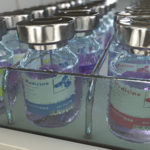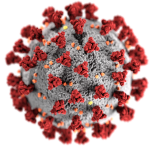On October 24, 2 022, AstraZeneca announced that Imjudo (tremelimumab) in combination with Imfinzi (durvalumab) has been approved in the US for the treatment of adult patients with unresectable hepatocellular carcinoma (HCC), the most common type of liver cancer. Tremelimumab (CP-675,206), originally developed by Pfizer using Abgenix’s XenoMouseÔ technology, is a human IgG2ҡ antibody targeting CTLA-4. In 2011, MedImmune (now AstraZeneca) gained tremelimumab’s global development rights, while Pfizer retained the rights for use in certain combination therapies. Tremelimumab blocks the activity of the immune checkpoint CTLA-4, contributing to T-cell activation, fostering antitumor immune responses and cancer cell death. Tremelimumab and anti-PD-L1 durvalumab (Imfinzi) were granted Orphan Drug designation in the US for the treatment of hepatocellular carcinoma (HCC), and tremelimumab was also granted Orphan Drug designation for HCC in the EU. On October 24, 2022[JR1] , FDA approved the combination of tremelimumab with Imfinzi for unresectable advanced liver cancer based on the results of the Phase 3 HIMALAYA trial. Marketing applications for this combination for liver cancer is under review by regulatory authorities in other countries and regions. Moreover, based on the results of the POSEIDON trial, marketing applications for the combination of tremelimumab with Imfinzi and chemotherapy for first-line metastatic NSCLC are also under review.
022, AstraZeneca announced that Imjudo (tremelimumab) in combination with Imfinzi (durvalumab) has been approved in the US for the treatment of adult patients with unresectable hepatocellular carcinoma (HCC), the most common type of liver cancer. Tremelimumab (CP-675,206), originally developed by Pfizer using Abgenix’s XenoMouseÔ technology, is a human IgG2ҡ antibody targeting CTLA-4. In 2011, MedImmune (now AstraZeneca) gained tremelimumab’s global development rights, while Pfizer retained the rights for use in certain combination therapies. Tremelimumab blocks the activity of the immune checkpoint CTLA-4, contributing to T-cell activation, fostering antitumor immune responses and cancer cell death. Tremelimumab and anti-PD-L1 durvalumab (Imfinzi) were granted Orphan Drug designation in the US for the treatment of hepatocellular carcinoma (HCC), and tremelimumab was also granted Orphan Drug designation for HCC in the EU. On October 24, 2022[JR1] , FDA approved the combination of tremelimumab with Imfinzi for unresectable advanced liver cancer based on the results of the Phase 3 HIMALAYA trial. Marketing applications for this combination for liver cancer is under review by regulatory authorities in other countries and regions. Moreover, based on the results of the POSEIDON trial, marketing applications for the combination of tremelimumab with Imfinzi and chemotherapy for first-line metastatic NSCLC are also under review.
HIMALAYA (NCT03298451) is a randomized, open-label, global Phase 3 trial evaluating the safety and efficacy of durvalumab monotherapy and the combination of durvalumab and tremelimumab versus sorafenib, a standard-of-care multi-kinase inhibitor, as first-line treatment in patients with unresectable HCC who had not received prior systemic therapy and were not eligible for localized treatment. The combination of durvalumab and tremelimumab, called the STRIDE regimen (Single Tremelimumab Regular Interval Durvalumab), comprises a single priming dose of 300 mg of tremelimumab added to 1500 mg of durvalumab followed by durvalumab every four weeks.[1] Patients were randomized to STRIDE (n=393), durvalumab (n=389), or sorafenib (n=389). The primary outcome measure was overall survival. Results of the HIMALAYA trial were presented at the American Society of Clinical Oncology Gastrointestinal Cancers Symposium held January 20-22, 2022 in San Francisco. At data cutoff, the primary objective was met: OS was significantly improved for STRIDE vs sorafenib (hazard ratio [HR], 0.78; 96% confidence interval [CI], 0.65–0.92; p=0.0035. 3). In addition, the ORRs were higher for STRIDE and durvalumab (20.1% and 17.0%, respectively) than for sorafenib (5.1%).
Interested in more information about approved antibody therapeutics? Explore our searchable table of antibody therapeutic products for details.




